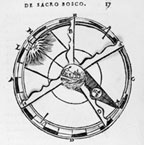:: Monday, February 14, 2005 ::
 NEW.WRITING: Reading the Net (books cited)
NEW.WRITING: Reading the Net (books cited)
BY: Molly Hankwitz
Judy Wajcman, one of the most prolific feminist writers in technocriticism today, has encapsulated and critiqued the most prominent debates of'technofeminism' in her new book, "Technofeminism"(2004, Polity Press/UK). With excellent sections on the 'cyborg' question as well as finely-tuned tracings of historic feminist concepts as they have been translated or not into the electronic age, this book is essential for anyone interested in de-gendering cyberspace or understanding the critical role that feminism has played in the history and critique of technoculture. Writing from outside the US gives Wajcman some keen insights into someone like Donna Haraway,for example, to whom she gives ample attention and the freshness of Wajcman's cyber-feminist 'voice' is that she thinks about the mythologies of digital 'flexibility' and the 'feminization' of IT sector labor not just about cute games and sexy veneers. This book is important reading for anyone interested in internet scholarship.
Amidst the sea of new writing coming out around cyberethography/cybergeography, an outstanding text for its specific focus on largely underrepresented net.artists of Southeast Asia, is this new work by Radhika Gajjala, associate professor of communcation studies at Bowling Green University, prolific virtual communitarian and feminist cybernaut, 'Cyber Selves: Feminist Ethographies of South Asian Women' (2004, Altamira Press/USA) Emerging from her PhD thesis, Gajjala has here drawn together unique and original online experiences from subject identities of Southeast asian women on line. Lisa Nakamura endorses the book by saying, in part: "[Gajjala's] lyrical interventions into the form of an academic book disrupt expectations about what ethnography ought to look like." (1) "Interrogating Identities: Composing Other Cyberspaces" and "Carving Disappearing Analogue/Digital "Selves" (co-authored with Annapurna Mamidipudi, are some of the choice samples of chapters. The comprehensivewriting on SAWNet (SouthAsiaWomensNet) articulates the kinds of spaces within which cyber-selves are formed and deals with the edges, borders and centers of virtual community. Gajjala asks all the critical questions on race, gender, and class in this age of the Internet. An excellent read and unusual post-colonial cyber history.
__
1. 'Cyber Selves: Feminist Ethographies of South Asian Women'
(2004, Altamira Press/USA)
www.polity.co.uk
www.altamirapress.com